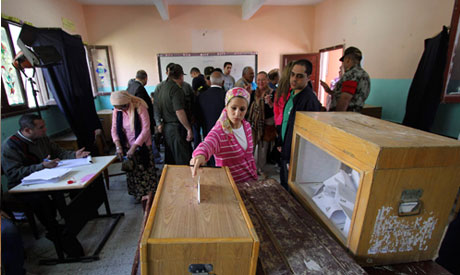
Egyptian voters casts their votes in a polling station in Cairo (Photo: AP)
The Egyptian Coalition for Monitoring Elections announced that the logistical violations during the recent referendum on the constitution amendments could nullify the procedure. However, perhaps more importantly, the will of the Egyptian people to engage with the process was beyond all expectations.
The results of the monitoring exercise, which included 1250 monitors in 26 governorates, organized by three major organizations, the Egyptian Organization for Human Rights (EOHR), the Andalus Institute for Tolerance and Anti-violence Studies, and the Egyptian Center for Women’s Rights, was announced today in a press conference at EOHR headquarters .
“This [the referendum] was a model that showed the will of Egyptian people, who went to vote in large numbers and stood in a civilized manner in 300 and 400 metre lines to be able to vote,” said Hafez Abu Saeda, Head of EOHR.
One of the major violations documented was the use of religion by many entities as a tool to push people to vote in a certain direction. “The majority of Egyptians voted according to the perspective that it was about whether they agree to keep Article Two (which says that Islam is the source of legislation) in the constitution or to remove it,” said Abu Saeda. That was not the real issue by any means but some religious figures convinced a portion of society to vote "yes" by making that this basic argument. “We are against the use of religion in persuading people in politics. Some sheikhs were saying that those who vote “yes” are with God and vice versa,” said Ahmed Sameh, of the Andalus Institute for Tolerance and Anti-violence Studies.
According to the election monitors, Copts were not like Islamists in using religion in voting. “While some religious leaders may have asked Copts to vote “no”, nonetheless they did not mention it as a religious action,” Sameh said.
The logistical flaws of the elections varied and included the lack of a voters’ list, absence of stamped voting sheets, absence of phosphoric ink, the lack of an adequate number of voting ballots, and not allowing the monitors to observe the vote counting.
One of the major violations in this election was the absence of a voter’s list. Everyone was allowed to vote where they wanted, which led to some voters voting more than once and some underage citizens voting as well. “If this was a presidential election, of course it would have been counted,” said Sameh.
Civil society monitors were not allowed to attend the vote counting. “This is very bad. If you exclude me from a part of the process, I have the right to become suspicious,” said Sameh.
Some activists were arrested during their monitoring of the elections, including the rights lawyer Ragia Omran. Omran was arrested and released on the same day.
Moreover, this election has witnessed the least amount of violence in comparison to previous ones. The attack on the prospective presidential candidate Mohamed ElBaradei “was the most violent scene” in the election, according to Abu Saeda.
Moreover, the time given (11 days) between announcing the referendums and the voting date “was too short for having any national dialogue; instead the Muslim Brotherhood had time to persuade people towards what they want,” said Sameh.
The monitoring coalition recommends that civil society should engage in the law organizing political life and that polling stations should process only 500 voting sheets instead of 1000 for things to go smoother next time. Also, the monitors have to have the right to monitor inside and outside the polling stations. “We also want a new election law,” said Abu Saeda.
“We still have political fears regarding the future. We have fought a corrupt system but we still have to fight against the possibility of an army dictatorship or a religious one,” Sameh said.
Short link: